
In exactly one hundred days, sport climbing will once-again grace the Olympic Games, and the search for the next Olympic sport climbing champions will begin.
When climbing debuted at the Tokyo Olympics in 2021, there were a number of memorable moments. Janja cruising her way to the gold, Akiyo bowing out of competition climbing with a bronze in front of her home crowd, Jakob topping the lead route and realising that he'd won bronze, and even Bassa Mawem's heartbreaking torn bicep, which meant he was unable to compete in the final.
Perhaps one of the most powerful memories, however, was of confusion, confusion that speed, lead, and boulder - three disciplines that are so very different - had been combined together, and confusion at the scoring system, which seemed to reward winning an individual event more generously than consistently performing well across all three events.
In Paris, much of this will change. Whilst we may not yet have the three individual events that we all wanted - that's likely to debut in LA in 2028 - we did get a partial split, with one set of medals being awarded for Speed, and one set for a combination of Boulder and Lead.
Last year, Natalie published a breakdown of the new and (I would argue) improved scoring system. Whilst the combined format still requires some maths, it seems a bit more fair than the Tokyo system, and certainly rewards consistent performance across the two events more than it does winning the individual events.
Which got me wondering, if this system had been in place last Olympics, with Boulder and Lead combined with the new scoring system, who would have taken the Gold?
A reminder of the Paris scoring system:
As Natalie explained in her (much more in depth) piece on the Paris scoring system, the scoring in Paris will work as follows:
Boulder
There will be four boulders in total at the Paris Olympics, each of which will have two zones and one top, with points allocated as follows:
ZONE 2 - 10 POINTS: Ten points will be awarded to climbers who are able to control the second zone hold, but not the top hold, regardless of whether they controlled the first zone hold.
TOP - 25 POINTS: Twenty-five points will be awarded for a Top, regardless of whether the competitor has controlled any of the Zone holds.
Within the Bouldering, number of attempts will be accounted for through points deductions, with 0.1 points being deducted for each failed attempt on a boulder.
For example, a flash of a boulder would be worth 25 points; a second-go Top would be worth 24.9 points; reaching the first Zone on a third attempt would be worth 4.8 points.
Note: the 0.1 point deduction only applies to attempts prior to controlling the highest Zone or Top.
i.e. an athlete who got to the second Zone on their first attempt, but then failed to get that far again over the next four attempts, would have a score of 10, due to getting the second zone on their first attempt. Were that climber to go on to reach the top of the boulder on their sixth attempt, their score would change to 24.5 points. 25 points for the Top, and -0.5 points for the five previous failed attempts to reach the Top.
The deduction is only relevant for 'attempts until success' at the highest tier of hold (Zone 1, Zone 2 or Top) reached.
Total points available: 100

Lead
The Lead routes (one per round) will be split into sections of holds, with each section gradually awarding a greater number of points per hold as the athletes progress up the route.
Only the highest 40 holds of the Lead route will grant points to the athletes.
From the Top to the bottom:
The 10 holds prior = 3 points per hold
The 10 holds prior = 2 points per hold
The 10 holds prior = 1 point per hold
Any holds beneath that = 0 points per hold
Athletes who fall while moving towards the next hold will be awarded +0.1 points, the equivalent of the '+' in World Cup scoring.
(Climbers must secure the Top hold and clip the final quickdraw for 100 points to be awarded. Failure to clip will result in a score of 99.9, or an early clip without continuing to the Top hold will not be scored as a Top/100 points.)
Total points available: 100
The Combined Score
The Paris 2024 scoring system is a simple addition of the points earned in the Boulder and Lead rounds.
Some necessary adjustments...
For a number of reasons, retro-fitting the Paris scoring system to the Tokyo Olympics is far from an exact science.
Firstly, I'm ignoring qualification, which would have almost certainly put a different group of men and women into their respective finals. If someone fancies checking that out then be my guest, but I'm starting from the final...
Secondly, the fact that there were only three boulders with one zone apiece in Tokyo, whilst there will be four boulders with two zones apiece in Paris, complicates things.
As there was only a single zone per boulder in Tokyo, it's impossible to accurately work out how the boulder event would have been scored, because we don't know where the first and second zone holds might have been placed. As such, instead of randomly allocating a lower zone hold for each boulder, I've imagined that Tokyo was simply a '10 points for the zone' situation.
Finally, as both boulder and lead will be scored out of 100 in Paris, we have to do a little bit of adjusting with the relative values of each discipline. There will be four boulders in Paris whilst there were only three in Tokyo, so instead of imagining a fourth boulder, or making each boulder worth 33.333333333 points, I've simply made the maximum score for both boulder and lead 75 instead of 100.
That means that we'll score the boulder normally - three boulders with 25 points each as a maximum score - but we'll multiply the lead scores of the Tokyo athletes by 0.75 so that the maximum score for lead is 75 as well, to ensure that lead scores aren't weighted more heavily than the boulder scores.
Men:
In Tokyo, Alberto Gines Lopez came first in Speed, Nathaniel Coleman came first in Boulder, and Jakob Schubert came first in Lead, and it was those three - in that order - that won the Gold, Silver, and Bronze medals.
The final rankings were as follows:
- Alberto Gines Lopez
- Nathaniel Coleman
- Jakob Schubert
- Tomoa Narasaki
- Mickael Mawem
- Adam Ondra
- Colin Duffy
- Bassa Mawem
Boulder:
Under the adjusted Paris scoring system, the boulder round would have been scored as follows:
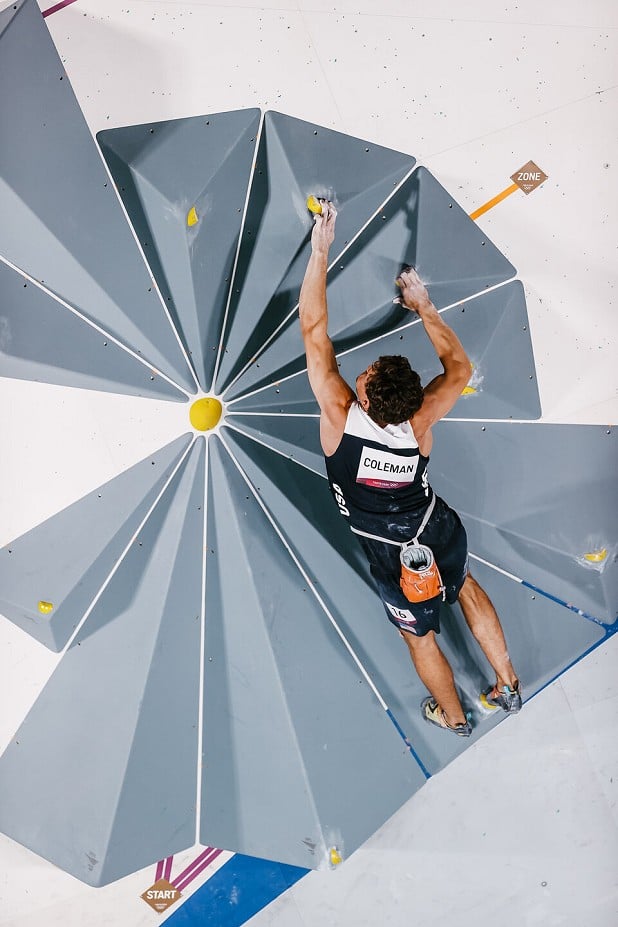
Lead:
There were 45 holds on the men's route in Tokyo, meaning that the scores would have been calculated as follows:
Holds 26-35: 3 points
Holds 16-25: 2 points
Holds 6-15: 1 point
Holds 0-5: no points
Movement towards the next hold: +0.1 point
A reminder that all lead scores are multiplied by 0.75 in this instance, to account for the fact that there were only three boulders in Tokyo, whereas there will be four in Paris.

Overall scores:
Adjusted medallists:
SILVER - Nathaniel Coleman - 106.625
BRONZE - Colin Duffy - 104.8
4th - Adam Ondra - 100.975
5th - Tomoa Narasaki - 85.375
6th - Alberto Gines Lopez - 83.475
7th - Michael Mawem - 71.1
8th - Bassa Mawem - DNS
So, instead of the somewhat anti-climactic moment where Jakob topped out the lead route, and in doing so made Alberto Gines Lopez Olympic champion, the updated system would have seen Jakob starting the lead route at the bottom of the pack, and climbing past all other competitors, all the way to Gold. Whilst Coleman would have kept his Silver, Colin Duffy's consistency - coming third in both boulder and lead - would have awarded him a Bronze medal.
Incidentally, had the Tokyo Olympics been Boulder and Lead only, using the original Tokyo scoring system, then the final results would have been as follows:
Jakob Schubert and Nathaniel Coleman tied for Gold with 6 points.
Adam Ondra and Colin Duffy tied for Bronze with 12 points.
Mickael Mawem comes fifth with 14 points.
Tomoa Narasaki comes sixth with 18 points.
Alberto Gines Lopez comes seventh with 28 points.
Bassa Mawem in 8th.
So, the separation of boulder/lead and speed itself wouldn't have been enough to separate the competitors, and whilst the final standings would have been relatively similar to the imagined Paris results, more separation would have been needed to avoid the three medals being split between four athletes.
What about the women's final?
Women:
With Janja Garnbret winning both Boulder and Lead at the Tokyo Olympics, it's no surprise that she also would have won under this new system. In Tokyo, the final results had the top eight arranged as follows:
- Janja Garnbret
- Miho Nonaka
- Akiyo Noguchi
- Aleksandra Miroslaw
- Brooke Raboutou
- Anouck Jaubert
- Jessica Pilz
- Seo Chaehyun
However, under the Paris scoring system, things may well have ended up quite differently for one climber in particular...
Boulder:
The boulder round finished as follows:
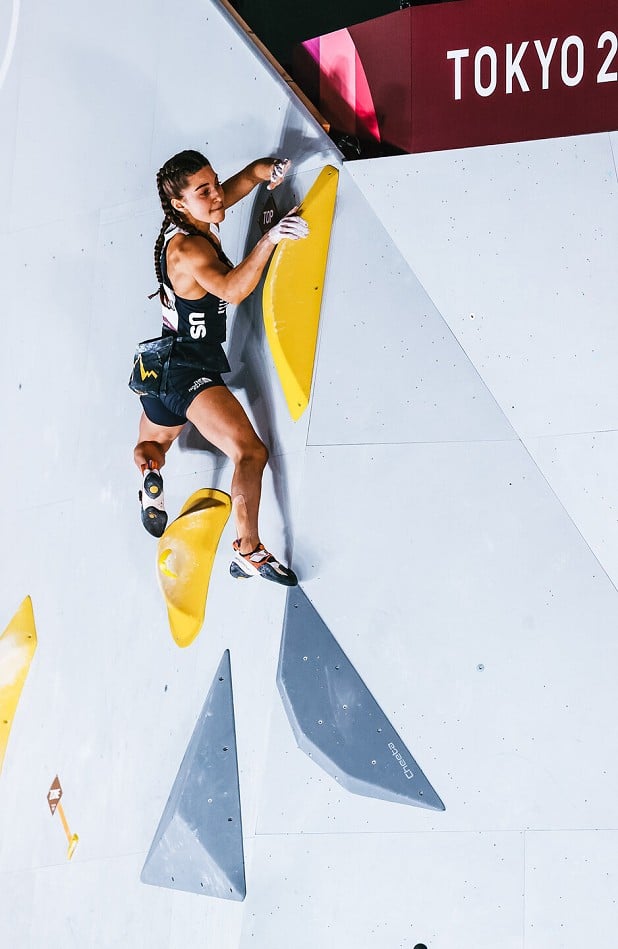
Lead:
As for the men's lead route, the women's had 45 holds, meaning the scoring would have been calculated as follows:
Holds 26-35: 3 points
Holds 16-25: 2 points
Holds 6-15: 1 point
Holds 0-5: no points
Movement towards the next hold: +0.1 point
Again, lead scores are multiplied by 0.75 to make sure that each discipline is weighted equally.
Overall scores:
Adjusted medallists:
SILVER - Jessica Pilz - 62.025
BRONZE - Akiyo Noguchi - 48.75
4th - Chaehyun Seo - 45.075
5th - Brooke Raboutou - 44.375
6th - Miho Nonaka - 36.25
7th - Anouck Jaubert - 6.075
8th - Alexandra Miroslaw - 3.075
Here, perhaps unexpectedly, we see an even bigger change than we do in the men's side of things, with Jessy Pilz jumping from seventh position all the way up to the silver medal position. Janja wins (obviously), and Akiyo retains her farewell bronze, but - with her third place speed finish no longer considered - Miho misses out on a home Olympics silver medal.
Had the women's comp in Tokyo been Boulder and Lead only (and with the original scoring system) then the final results would have been as follows:
Janja Garnbret would cruise to 1st place with a perfect '1' point.
Brooke Raboutou would take silver with 12 points.
Chaehyun Seo would have slipped into bronze position with 14 points, despite having not reached a single zone in the bouldering.
Both Miho Nonaka and Jessy Pilz would finish in fourth with 15 points.
Akiyo Noguchi would have missed out on her farewell Bronze medal with 16 points.
Anouck Jaubert and Alexandra Miroslaw would have come in seventh and eighth positions, with 42 and 64 points respectively.
Summary:
After all was said and done in Tokyo, there was a lot of conversation about how the combination of the scoring system and the combining of speed with lead and boulder had failed to accurately represent both the sport of climbing, and the reality of who the best all-round climber in the world was.

This was particularly noticeable in relation to the men's final, perhaps because many saw it as an opportunity for Adam Ondra to assert his status as the 'greatest of all time', and nobody suspected Alberto Gines Lopez to take the Gold, whereas Janja strolling her way to the top spot - followed by home favourites Miho and Akiyo - lined up more with our expectations.
However, whilst Jakob may have won gold under the Paris scoring system, and Colin Duffy would have crept onto the podium as well, it's Jessy Pilz who would have benefitted most from a Parisian discipline split and scoring system in Tokyo, as it would likely have taken her from a lowly seventh place all the way to a silver medal.
In reality, of course, this is all conjecture, since speed, lead, and boulder were all combined in Tokyo, and the scoring system was different.
However, in 100 days time, Jakob, Colin, Jessy, and the rest of the Paris 2024 Olympic Athletes will have a chance to make the most of this new system, when the competition to become the next combined sport climbing Olympic champion begins.

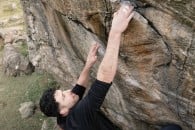

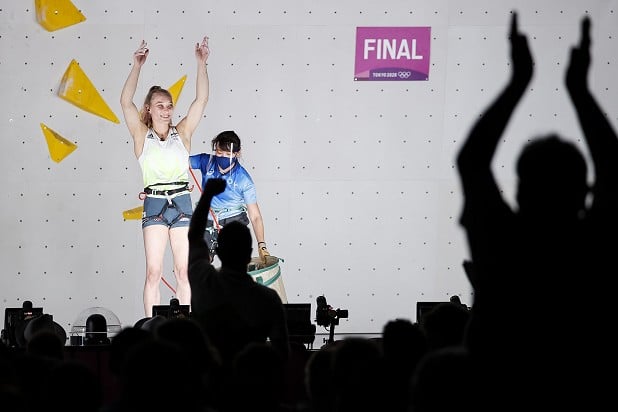
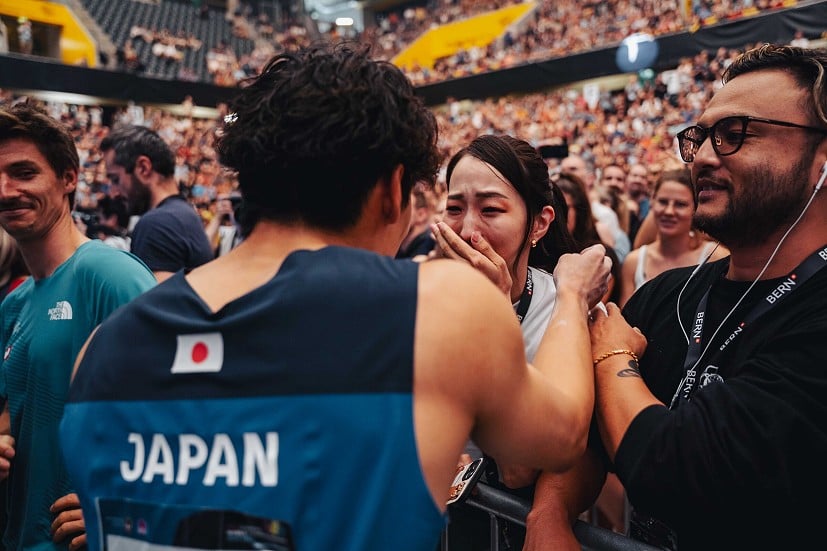
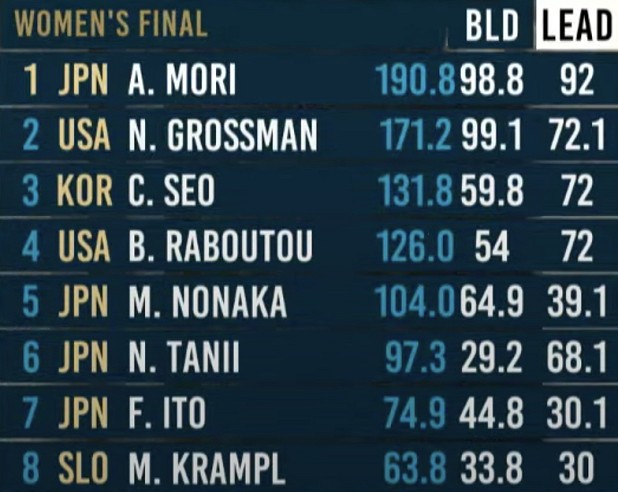
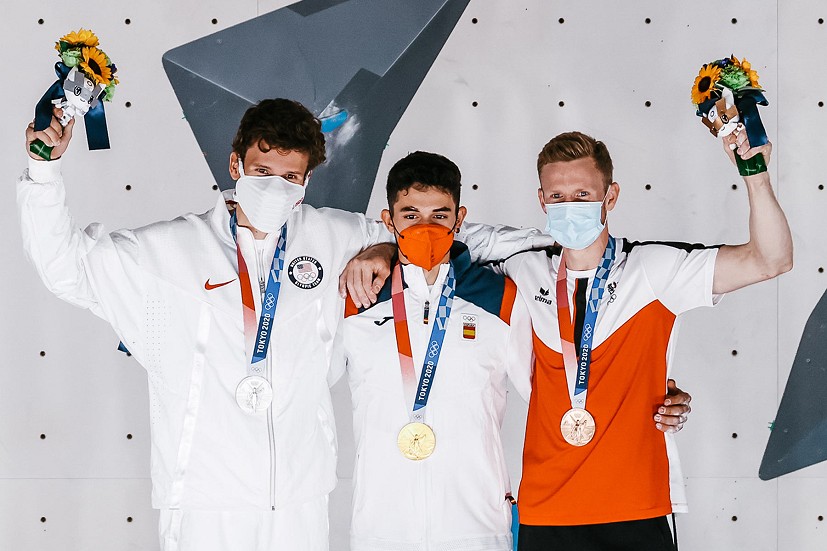
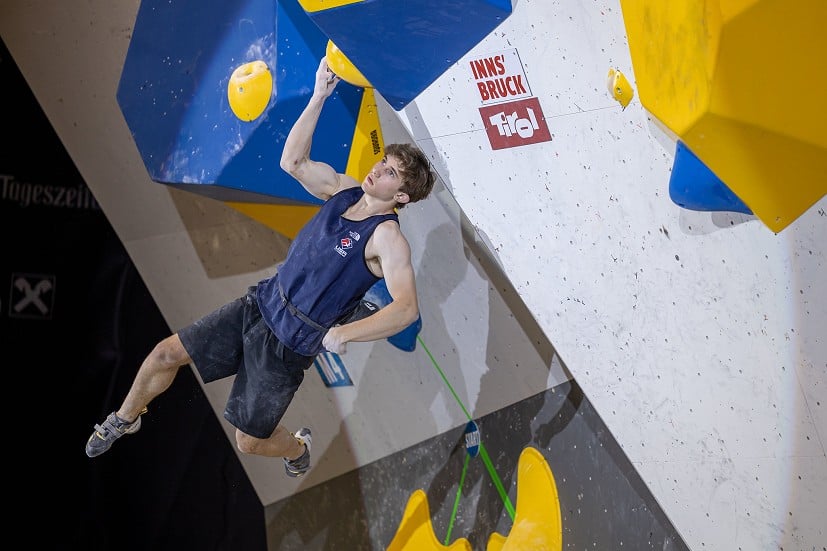
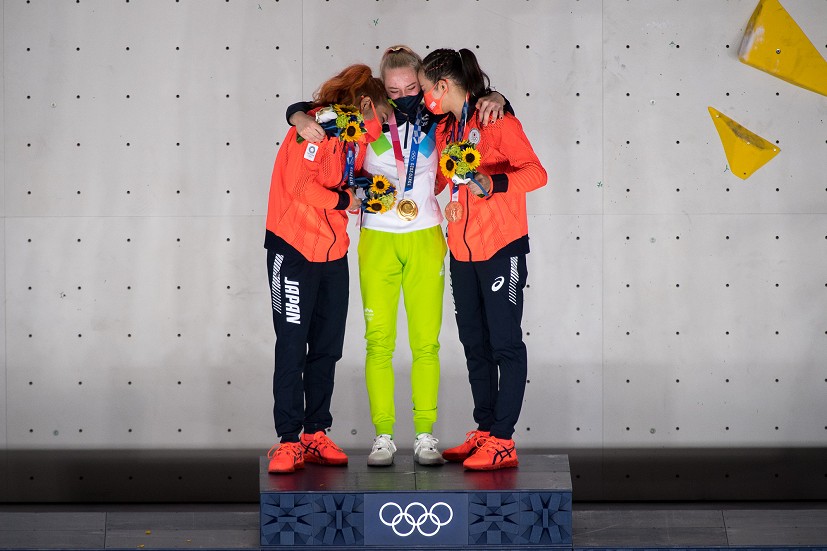
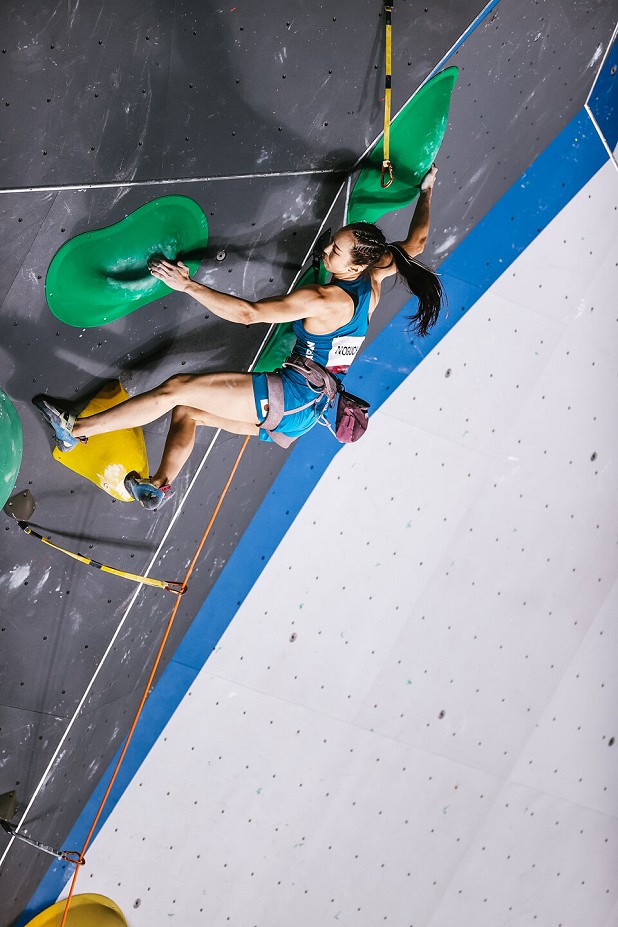
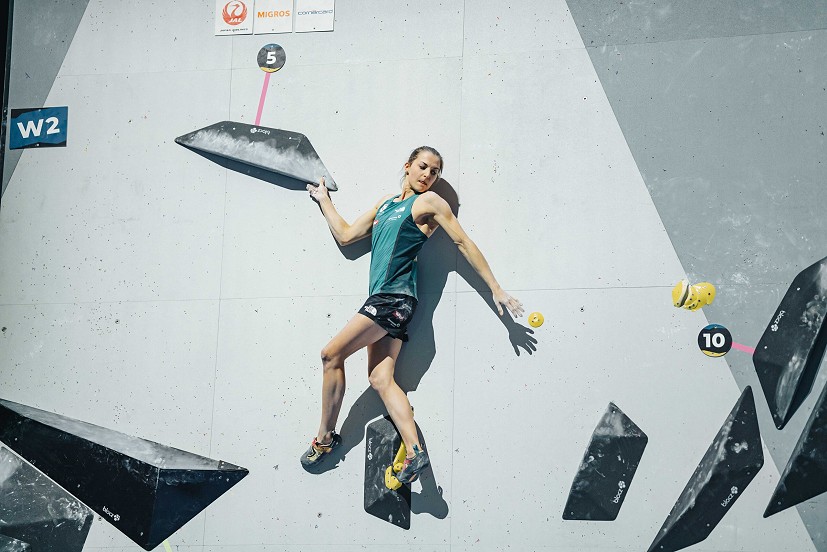











Comments
Great article
Nice little article which must have taken a decent amount of work to put together. Someone surely has to be bored enough to find out who would get through to the finals based on the scoring system.
It does seem the article could be a bit clearer about when it is comparing the new scoring system (points system + discipline split) or just comparing the point scoring system. The change in male medallists is predominantly down to the discipline split and the the article demonstrates that the new point scoring system has no change except to introduce important nuisances so that there are less tied results. Given that that summary is contained within a section calculating the new points, the way I read the article seems to suggest the point scoring is what creates the change (which it doesn't). This seems a little misleading to me but ultimately the article does contain all the necessary information and does clarify the influence of the discipline split, although this feels more like a caveat rather than key information.
For the women's results, it seems sensitive to all parameters and each individual change has significant influence on the final ranking. The way it is presented doesn't really matter because there is little consistency in the ranking anyway except that Janja always wins.
Hard to disagree with that!
Whichever system is employed, the men's result was not immediately obvious to the viewer, while the women's was.
With the greatest of respect to Gines-Lopez, in Tokyo the gold went to the 5th fastest speed climber (based on fastest time posted in the final), the 7th best boulderer and the 4th best lead climber. I.e. the result was completely distorted not just by the scoring mechanism but by the head-to-head nature of the speed round, which is what allowed Gines-Lopez to come first in that round (not to mention Ondra getting a bit of a bye due to Bassa Mawem's injury).